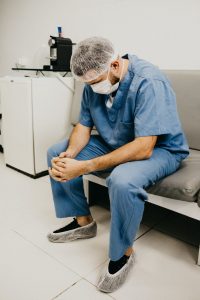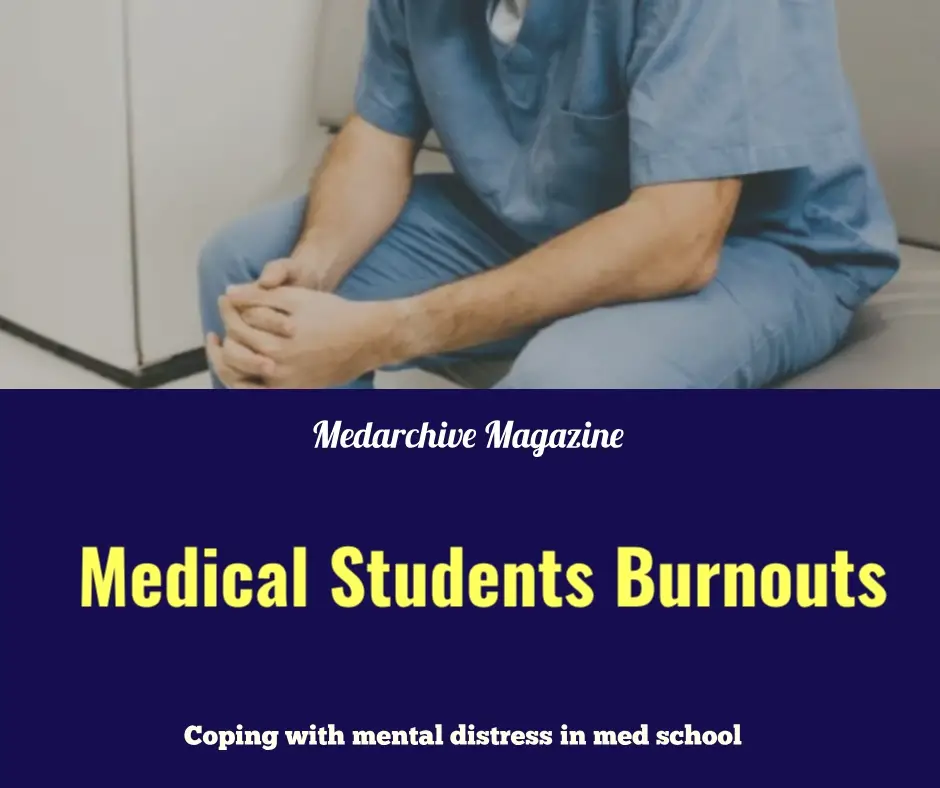This post was written to advocate for the modification of certain clinical medical exams where the chances of a medical student passing are largely dependent on a single examiner. Such exams are not the true test of clinical knowledge and should be modified. All the characters and scenarios used in this post are fictional and simply used by the author to make a point. Also, in this post, you will be finding some tips I use in dealing with medical students mental health challenges and burnouts.
For many medical schools, the ability to remain sane through your medical career is a real superpower.
Medical student mental health issues have never been so high in many developing countries with the increasing competitiveness in the medical profession and the rigorous and subjective nature of some medical exams.
Table of Contents
- Medical Students Burnouts: The Major Cause
- Medical Students Mental Health: Possible Debates From Simon’s Story
- Medical Students Burnout: The Impact of Similar Exam Models On Medical Students
- Medical Student Mental Health: How To Cope With Burnouts In Medical School
- Conclusion
Medical Students Burnouts: The Major Cause
Simon is a 5th-year medical student at a medical university.
As a child, Simon had always nursed the dream of becoming a medical doctor.
But with every encounter he has in the process of pursuing this dream career, he is almost stressed to the point that suicide is a valid consideration for him.
Even though he was a topper during his high school days, to get admitted into medical school, he had to compete against the best brains in the country and he only managed to get admission through the merit admission list.
On the other hand, the school in order to meet the demands of some influential people had to admit more medical students than their capacity can hold.
While being mindful of the fact that the school cannot graduate more than a certain number of students depending on their quota.
So for Simon to become a doctor, he will have to pass through unnecessarily difficult medical exams which are also subjective on some occasions.
Subjective in the sense that your probability of passing it is dependent on a very large denominator; the kind of examiner you meet during such subjective medical exams.
Simon had two distinctions in the 1st medical professional exam (the rate-limiting exam) at the first attempt, and he has performed above average in the rest.
But a much bigger challenge has been set before Simon in his 3rd medical professional exam.
In the clinical aspect of one of his exams, students writing this exam were to be shared among different consultants which they are not allowed to know beforehand.
And each student is to clerk patients with different symptoms and present such cases to the consultants they were assigned to.
This must be completed under a specific time frame which is the same for all the candidates.
So the situation here is that all the medical students writing this exam will never pass through the same examination.
First, the patients they are to clerk and present are different people with different temperaments, different medical conditions, different symptoms, and different needs.
And to crown it all, more than half of the consultants that will be examining the students are not any different from the patients; they also have different temperaments, schools of thought, and different standards of judgment.
But they were to examine and score students independently without a specific scoring guide but will adapt subjectively to the type of complaints a student presents.
Simon Failed This Exam
Yes, Simon even though he was well prepared as he usually does in his previous medical exams failed this exam.
He didn’t have the best of luck on the exam day.
He was one of the last persons to clerk a patient who was already irritable due to a number of questions he has been asked that day by some of the students writing that exam.
As if that was not enough, the patient’s relative threatened to sue Simon if he ever touched the patient in the name of physical examination.
Simon struggled through all these adversities at the same time while his colleagues clerked other cooperative patients during the early hours of the exam.
And to crown it, Simon was to present this clerking to an examiner generally accepted by medical students who pass through this exam as someone who is difficult to please.
Coping with this mental trauma for someone who has not failed a medical exam before, and has even had 2 distinctions during his 2nd MBBS exam was a difficult one.
But he had no one to solicit on his behalf since, in the records, it was written that he failed the clinical part of that exam.
Even though there was no objective way to assess him.
He could not possibly have gotten everything wrong, but maybe some mistake in the course of his presentation gravely irritated his examiner and that was how the story ended, with all the parts he did well completely forgotten.
Medical Students Mental Health: Possible Debates From Simon’s Story

Arguments Supporting A Clinician’s Omnipotence
I have heard some of my ‘chiefs’ in medical school argue that a clinician should have the power to convince a patient to agree to informed consent.
In this case, I am referring to the part where a clinician has to deal with an already irritated patient and their relative in the course of taking a history that will be relevant to the patient’s management.
So because of this, it is ‘assumed’ that to become a doctor, medical students must have mastered the art of conning a patient to get them to agree with what they want to do as long as it will be of benefit to them.
So some argue that a student’s ability to handle and tame such a patient during your exam is also part of the exam.
My Point of view
While I understand the part where medical students are expected to learn how to tame an irritable patient and their relative, I do not understand why that should be considered part of an exam that is an objective assessment for medical students at the same level, writing the same exam.
This is bearing in mind that they will meet different patients, and different examiners, and be given the same amount of time.
It would have been bearable if every student writing the exam encountered a similar scenario in a structured way and manned by examiners to see how each student will handle such a scenario before scoring.
If an exam is objective, it should not have any form of bias.
It should be structured in a way that when anyone deploys a similar strategy under a similar condition, he/she should get a similar result as the majority of the population who did the same for a similar scenario.
If not, it would be assumed that all the students never wrote the same exam, so how can you judge them all using the same standard?
Argument Supporting The Examiner’s Omnipotence
Another argument I have heard supporting this type of medical exam is routed in the traditional method in which medicine was formerly practiced.
An apprentice is considered worthy of being called a physician after he has done all that is possible to satisfy his teacher.
Those who support this belief that a medical student can only pass a medical school exam if he is able to satisfy his examiners.
My point of view
The problem with this is that it leaves the fate of a student in the hands of his/her examiner thereby making the exam a subjective one.
Without a thoroughly reviewed scheme or examination standard or guide, it will be difficult to judge this student objectively.
So if a student makes a mistake in the course of the exam, it could be judged as a complete failure even if such a student had done well in some other parts of the exam.
So what if it is possible to get a general marking scheme for the clerking component of clinical exams with marks distributed evenly to those areas considered by examiners as the most important in clerking.
I believe it will be a lot more objective.
Medical Students Burnout: The Impact of Similar Exam Models On Medical Students
Although medical students are known to have a great deal of mental strength and resilience, it is still possible that they could still suffer burnout resulting from adverse exam conditions to which they are subjected in medical school.
In my case, I remember writing a major medical exam within a period of 4 days without breaks in between.
And it happened that within this time, the medical school also had light issues as a result of a broken transformer.
This is the worst exam timetable and condition I have ever witnessed as a medical student.
A lot of colleagues broke down, some fell sick and in the end, some still failed the exam because the clinical exam did not go well.
There are lots of adjustments that need to be done in medical schools to improve the study condition of medical students, especially in developing countries.
Medical Student Mental Health: How To Cope With Burnouts In Medical School

There is no clear-cut way of coping with medical students burnout.
Everyone has a burnout threshold and knowing the limit at which you can no longer take things is very important in dealing with medical student mental health challenges.
Some reports from colleagues after a short interview revealed that the following has been helpful to them in dealing with medical students burnouts;
- Attending Medical Students Forums Is Important if it is active in your school.
- Identify with your academic advisor. Lots of students in my school shy away from this. But good advisors could be your advocate when you land into a difficult situation in school.
- Joining associations, fellowships, and other school organizations which could serve as an outlet for stress in medical students. In my case, I have found the Rotaract club very rewarding in terms of letting out stress.
- Staying in tune with your mind and spirit. If you are a believer in any force or spirit, having interactions occasionally with such can be relieving. If you don’t, then having some alone time every in school when you discuss with yourself might help.
- Interaction and hanging out with friends are also helpful
- Take care of your body. Eat well, exercise, and read other good books not just academics.
- Develop your hobbies and engage in them passively even while in medical school
- Use Medical school motivational quotes and activities to remain inspired.
- Finally, be at peace with your parents, guardians, and relatives if you have any.
Conclusion
Dealing with medical students burnouts can be difficult especially when the stressor is an external factor like meeting an unfortunate examiner in your medical exams.
This can be overcome by being a better medical student and learning to cross your T’s and I’s in such medical exams.
Other causes of burnout in medical students are adverse study conditions and environment this could be prevented at the onset of choosing a medical school.
Always choose the best medical school in your place of residence.
If you are already stuck in a medical school you don’t really like, then consider changing institutions or enduring the pain till your graduation.
I hope this post helps lots of medical students trapped in an unending chain of mental distress.
Medical students burnout is really a thing and should be combated to save our future doctors.
Other Posts You May Like:
- What are the Medical School Subjects and Recommended Textbooks? (MBBS Subjects)
- 8 Ways of Ending Mental Health Stigma through Mental Health Literacy
- 12 Myths About Medical School; Lies You Must Debunk
- MBTI IN School: 16 Personalities In Medical School





Thank you for reading through